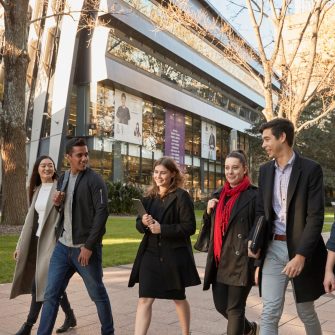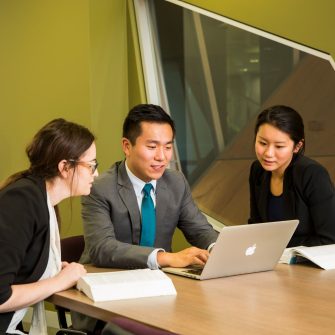Juris Doctor
- Commencing Terms
- Term 1 & 3
- Duration
- 3 Year(s)
- Delivery Mode
- Face-to-face (includes blended)
- Campus
-
Kensington
- Codes
- CSP UAC code 910600
- Full Fee UAC Code 910601
- Program code 9150
- CRICOS code 068850G
-
Commonwealth Supported Places are available for this program2026 Indicative CSP first year fee
- $17,500*
-
2026 Indicative CSP fee to complete degree
- $53,000*
-
2026 Indicative first year full fee
- $60,500*
-
2026 Indicative full fee to complete degree
- $193,500*
Application closures for 2026
International applications for all undergraduate programs, as well as postgraduate programs offered by the faculties of Arts, Design & Architecture, Engineering (excluding Master of Information Technology and associated programs) and Science are now closed to New Overseas Student Commencement (NOSC) for 2026 intakes.
Postgraduate programs offered by the Business School and the faculties of Law & Justice and Medicine & Health remain open. Master of Information Technology (and associated programs) also remain open.
- Overview
- Entry requirements
- What will I study?
- Future careers
- How to apply
- Fees & Scholarships
Overview
Are you seeking a career in law? The UNSW Juris Doctor provides a pathway to legal practice in Australia. It’s designed for those who already hold a degree in another field or a law degree from overseas. The Juris Doctor is a foundational step in becoming a practising lawyer and it also opens doors to careers in government, business, policy and international relations.
When you enrol in the Juris Doctor program at UNSW, you’ll join Australia’s #1 law faculty (QS World University Rankings by Subject, 2025) and study alongside like-minded, career-driven students. You’ll also benefit from the distinctive and highly rigorous teaching model of small-class seminars, with some core courses taught through a combination of face-to-face and online learning.
You’ll have the flexibility to study either full-time or part-time, to allow you to shape your study load term to term, and to plan a timetable to suit your life priorities. Weekend, evening and summer intensive courses are available and whilst face-to-face classes are primarily held at our main UNSW Kensington campus, some may also be offered at our CBD campus depending on availability, providing additional flexibility for students.
Key features
Learn in small, supportive classes
When you join the Juris Doctor program at UNSW, you won’t be one of hundreds in a large lecture theatre. You’ll learn in small, seminar-style classes where it’s easy to engage with peers and teachers. Through discussion and debate, you’ll develop practical skills such as reasoning, legal research, analysis, argument and negotiation. You’ll also have the opportunity to work alongside senior students through our Peer Tutor Program, open to all first-year Juris Doctor students.
Gain practical and international experience
From your first term, you’ll step beyond theory into real legal work through internships, clinics, mooting competitions and first-hand experience at our Kingsford Legal Centre (KLC) – UNSW’s on-campus community legal centre providing free legal advice, casework and legal education to the local community. You can also expand your horizons overseas, with student exchanges available in 38 countries, electives in China, USA, Switzerland, India, Vanuatu and Chile, and pathways to postgraduate study at Oxford or Hong Kong University.
Shape your study around your life
UNSW Law & Justice offers a distinctive and highly rigorous teaching model of small-class seminars, which is designed to flex around your commitments – you can adjust your study load from term to term, building a timetable that works for you. You can also blend campus and online learning, with the option to take up to half of your weekly classes virtually for some core courses. Evening, weekend and intensive options provide additional flexibility for students.
Why study at UNSW?
Study at Australia’s #1 law faculty
Graduate with a globally recognised degree from UNSW Law & Justice, ranked #1 in Australia and #12 globally for law and legal studies (QS World University Rankings by Subject, 2025).
Learn from leading researchers and teachers
At UNSW Law & Justice, you’ll gain an outstanding education from some of the finest academics, researchers and teaching fellows from Australia and overseas, whose expertise is often called on by the United Nations and the Australian Royal Commission. Learn from experts in technology law, human rights, contracts, environmental protection, Indigenous rights and a range of other existing and emerging fields.
Contribute to Progress for All
UNSW Law & Justice is rated 5/5 for research by the Excellence in Research for Australia Initiative – a rating that is well above the world standard. Research often focuses on achieving just solutions for the most vulnerable, including refugee work, development work in Myanmar, work with international students, sexual assault research and support for Uluru Statement.
-
UNSW Law & Justice and Oxford University Faculty of Law have signed a memorandum of understanding to allow UNSW Juris Doctor students to graduate with two internationally recognised qualifications in just three and a half years – the UNSW Juris Doctor and the Oxford Bachelor of Civil Law (BCL) or Master in Laws and Finance (MLF). Students can apply directly to Oxford upon completion of 96 Units of Credit (UOC) at UNSW.
-
UNSW Law & Justice and Hong Kong University Law Faculty have signed a memorandum of understanding that provides UNSW Law & Justice students studying for a Juris Doctor degree an opportunity to gain an LLM degree from HKU.
UNSW Law & Oxford students will need to follow the standard student exchange application procedure and must indicate their interest in the Pathway Program on the application for the First Semester of study at HKU.
9150
068850G
Kensington
910600 (CSP), 910601
144
767
Want to see more from UNSW Law and Justice?
Entry requirements
Entry into the UNSW Juris Doctor is based on academic merit. Students must have completed a tertiary qualification at Bachelor, Masters or PhD level in a discipline other than law, or a degree in law from an overseas institution.
Domestic Applicants
UNSW offers domestic applicants both Commonwealth Supported Places (CSP) and full-fee places in the Juris Doctor. CSP are offered to the most competitively ranked applicants and the remaining eligible applicants will be offered a full-fee place in the Juris Doctor program. You should list both CSP and full-fee codes in your UAC preferences if you wish to be considered for both places. For further information on eligibility and academic merit required, please refer to the admission criteria.
Aboriginal and Torres Strait Islander people considering the Juris Doctor may be assessed under the Indigenous Alternative Entry Scheme pathway. In addition to your UAC application please submit an Indigenous Alternative Entry Scheme application form.
If you’re in your final year and about to complete your bachelor's degree, please refer to the UAC guide for Admission Requirement Deadlines.
Admission pathways
Indigenous entry into UNSW Law & Justice Juris Doctor program
The Postgraduate Indigenous Entry Scheme for the Juris Doctor at UNSW is one of many support schemes to grow the number of Aboriginal and Torres Strait Islander people entering the legal profession.
You’ll be part of a cohort of students that are engaged with social justice initiatives and driven to be the next leaders in legal practice.
The scheme is competitive and students who best meet the selection criteria, outlined below, will be considered under the alternate entry scheme and have access to a Commonwealth Supported Place (CSP). The scheme is open to those who meet specific requirements.
Transfer from a full-fee place to CSP (UNSW Juris Doctor Awards)
UNSW Juris Doctor students enrolled in a full-fee place can apply to transfer to a Commonwealth Supported Place (CSP) after completing a minimum of 48 units of credit (UOC). Applications will be assessed on the results of your UNSW Juris Doctor study only. Awards will be offered to those students with the highest overall Juris Doctor WAM and a minimum WAM of 75.00 is required.
The awards offer a fee reduction up to a maximum of the difference in fees between a full-fee place and a Commonwealth Supported Place for the remaining duration of the awardee’s Juris Doctor program. Up to eight awards are available per year. Applications can be made through UAC Postgraduate. For further information please contact Future Students.
Transfer from another university
We welcome applications from law students wishing to transfer to the UNSW Juris Doctor from other universities. You may be eligible for advance standing, however a maximum of 48 UOC (1 year full-time) may be awarded for completed law studies. Only completed Bachelors, Masters or PhD qualifications will be considered for admission purposes.
Students who have completed more than 48 UOC may receive an exemption for the additional completed law subjects but no credit. This means they will have to choose elective law courses at UNSW to make up these additional UOC. Students should apply via UAC Postgraduate (also refer to the apply section below).
Credit Transfer Policy
If you've completed prior learning at another tertiary institution or in another UNSW degree, you may be eligible for a credit transfer. Find out more in the Credit Transfer Rules and Regulations.
English language requirements
You may be asked to provide evidence of your English proficiency to study at UNSW depending on your educational background and citizenship. English language skills are vitally important for coping with lectures, tutorials, assignments and examinations - this is why UNSW requires a minimum English language competency for enrolment.
If you’re completing an Australian Year 12 qualification (e.g. NSW HSC or equivalent), you do not need to provide anything extra to prove your proficiency. Your qualification will be used as evidence of your English proficiency.
If you do need to provide evidence of your English proficiency, this will be indicated in your application. You can prove this by providing evidence that you meet one or more of the following criteria:
- English language tests and university English courses
- Prior study in the medium of English
- Other qualifications
If you need to improve your English skills before you start your degree, UNSW College’s Academic English Programs are for you. The programs are suitable for various English levels and help you prepare for university studies and life in Australia.
For more details, visit the English Language Requirements page.
Entry into the UNSW JD is based on academic merit. Students must have completed a tertiary qualification at Bachelor level in a discipline other than law, or a degree in law from an overseas institution.
International Students
The UNSW JD is open to international applicants who have completed or are about to complete a bachelor's degree in any discipline. Those who have a degree in law from a different legal system may also apply for the UNSW JD. To be eligible, you generally need to have achieved an overall average of 70% or higher as determined by the UNSW Postgraduate Coursework Entry Calculator. You may also be eligible for advanced standing.
International applicants who have completed a tertiary qualification at Masters or PhD level in a discipline other than law or law from a different legal system, and have achieved an overall average of 70% may be assessed on a case-by-case basis.
Please note: Applicants from non-211 Chinese Universities interested in studying this program must achieve a minimum overall average of 84 in their current university’s grading system. This is equivalent to an 80% scaled average using the UNSW Postgraduate Coursework Entry Score Calculator.”
Admission pathways
Transfer from another university
We welcome applications from law students wishing to transfer to the UNSW JD from other universities. You may be eligible for advance standing, however a maximum of 48 UOC (1 year full-time) may be awarded for completed law studies. Only completed Bachelors, Masters or PhD qualifications will be considered for admission purposes.
Credit Transfer Policy
Credit Transfer Rules and Regulations information.
English language requirements
You may be asked to provide evidence of your English proficiency to study at UNSW depending on whether you are from an English-speaking background or non-English speaking background. English language skills are vitally important for coping with lectures, tutorials, assignments and examinations - this is why UNSW requires a minimum English language competency for enrolment.
If English is not your first language, you’ll need to provide proof of your English proficiency before you can be given an offer to study at UNSW. You can do this by providing evidence that you meet one or more of the following criteria:
- English language tests and university English courses
- Prior study in the medium of English
- Other qualifications
If you need to improve your English skills before you start your degree, UNSW College’s Academic English Programs are for you. The programs are suitable for various English levels and help you prepare for university studies and life in Australia.
For more details, visit the English Language Requirements page.
Check the specific English language requirements for this program
What will I study?
UNSW is introducing a new academic calendar from 2028.
We are moving to a new flex-semester calendar. What does this mean for your studies?
Program structure
The UNSW Juris Doctor is a flexible degree that takes three years of full-time study or a maximum of eight years of part-time study. You can choose to attend all classes on campus or complete up to half of the weekly seminars online. Classes are also delivered in a variety of formats, including daytime classes, evening classes, intensive classes (condensed study during term, weekends or over summer) or regular weekly classes.
Full program structure
This postgraduate degree program contains a total of 144 units of credit (UOC). Most courses are 6 UOC. Students must complete 16 core courses (96 UOC), 7 law elective courses (42 UOC) and 1 prescribed theory elective (6 UOC).
Core Courses – 96 UOC
- Crime and the Criminal Process
- Criminal Laws
- Lawyers, Ethics and Justice
- Principles of Public Law
- Principles of Private Law
- Introducing Law and Justice
- Legal Research and Writing
- Administrative Law
- Torts
- Contracts
- Business Associations
- Federal Constitutional Law
- Court Process, Evidence and Proof
- Law in the Global Context
- Resolving Civil Disputes
- Land Law
- Equity and Trusts
Law Elective Courses – 48 UOC
- Students may choose from over 200 law elective courses across diverse areas of practice, from commercial and corporate law to human rights, technology, environmental law and more.
Prescribed theory electives – 6 UOC each
- Law and Social Theory
- Legal Theory
- Theories of Law and Justice
- Legal Experimentalism
Below is an example of what you could study in a standard three-year full-time plan or a four-year part-time plan.
Full-time (eight subjects per year)
-
Eight core courses, for example:
Introducing Law & Justice*
Crime & Criminal Process
Principles of Private Law
Torts
Principles of Public Law
Criminal Laws
Contracts
Lawyers, Ethics & Justice
-
Seven core courses, for example:
Equity & Trusts
Administrative Law
Law in Global Context
Resolving Civil Disputes
Court Process, Evidence, Proof
Land Law
Federal Constitutional Law
+ One prescribed elective
-
One core course, for example:
Business Associations+ Seven law electives
Part-time (two courses per term)**:
-
Six core courses, for example:
Introducing Law & Justice*
Principles of Private Law
Torts
Principles of Public Law
Administrative Law
Contracts
-
Six core courses, for example:
Crime & Criminal Process
Equity & Trusts
Criminal Laws
Resolving Civil Disputes
Lawyers, Ethics & Justice
Federal Constitutional Law
-
Four core courses, for example:
- Court Process, Evidence, Proof
- Law in Global Context
- Business Associations
- Land Law
+ One prescribed elective
+ One law elective
-
Six law electives
*Introducing Law and Justice commences in Orientation Week (one week before the start of term). It’s taught in an intensive format during that week, helping you with the basic conceptual tools needed to study substantive law subjects. You’ll learn the principles of statutory interpretation and how to read and interpret case law, as well as essential legal writing and research skills.
** Part-time students can increase and decrease their study load. They are not required to take two courses each term. Students who take two courses each term can complete the degree in four years.
Future careers
A Juris Doctor can take you just about anywhere in the legal sector. Once you have completed the Juris Doctor program, you can begin your Practical Legal Training (20 weeks of coursework and workplace experience) and then apply to the Supreme Court for Admission to Legal Practice in Australia. You’ll receive a Practising Legal Certificate after two years of supervised legal practice, upon which you’ll officially be a lawyer (also kown as a solicitor). Read more about the path to becoming a lawyer.
A career as a solicitor offers high salaries and good job security. Demand for solicitors – who earn an average of $1,828 per week – is growing by 3.7% each year (Jobs and Skills Atlas Australia, 2025).
Other career pathways with the Juris Doctor qualification include roles in law, business, media, government, policy and international relations. You’ll stand out to employers who value skills like critical thinking, problem-solving, analysis, negotiation and clear communication. You’ll also have UNSW’s international reputation on your side – our Law & Justice Faculty is ranked #1 in Australia and #12 globally for employer reputation in law and legal studies (QS World University Rankings by Subject, 2025).
Becoming a Legal Practitioner
Study
Step 1 – Complete Tertiary Qualification UNSW Bachelor of Laws or Juris Doctor (JD).
Step 2 – Practical Legal Training – UNSW PLT (20 weeks of coursework and workplace experience)
Practice
Step 3 – Admission to Legal Practice – Apply to the Supreme Court for Admission
Step 4 – Practising Certificate (2 years) – Supervised legal practice
Step 5 – You’re a Solicitor
For more information on the pathways to becoming a legal professional, visit UNSW Practical Legal Training.
Accreditation
This program is accredited by the Legal Profession Administration Board and satisfies academic requirements for admission to legal practice.
How to apply
Applications for domestic students (Australian citizens, Australian permanent residents, Australian permanent humanitarian visa holders and New Zealand citizens) are processed through the Universities Admissions Centre (UAC) Postgraduate.
To be considered for both a CSP and full-fee place, ensure you list both codes in your UAC preferences. UAC program codes for the UNSW JD are:
- Commonwealth Supported Places (CSP): UAC code 910600
- Full-Fee Places: UAC code 910601
Ready to start your application?
For most international students, applications are submitted via our Apply Online service. We encourage you to submit your completed application as early as possible to ensure it will be processed in time for your preferred term. For more information visit our international applicant information page.
UNSW has a quota system, that ensures the faculty's enrolment is maintained at a level that maximises the quality of the teaching and learning experience at UNSW. Please be aware this is a high volume program and UNSW reserves the right to amend the application and acceptance deadline in order the keep within those limits.
Ready to start your application?
Fees & Scholarships
There are a limited number of Commonwealth Supported Places (CSP) available for this degree/program. To be considered for a CSP for this degree/program, please ensure you preference the CSP code in UAC. Please note that eligibility for Commonwealth Supported Places (CSPs) is competitive, with places awarded based on academic merit. Start your postgraduate application today with our guide on how to apply.
Commonwealth Study Assistance such as Austudy, and Youth Allowance is available for some master's degrees. For the most up-to-date information and list of degrees visit UNSW Current Student Financial Support.
There are a limited number of Commonwealth Supported Places (CSP) available for this degree/program. Your eligibility to receive a CSP will be automatically assessed when you apply. To find out more about Commonwealth Supported Places visit Postgraduate Commonwealth Support.
*Fees are subject to annual review (or when required) by the University and may vary accordingly.
Indicative fees are a guide only and have been calculated based on the typical enrolment patterns of students undertaking the degree/program. The indicative fees listed here is an estimate for tuition only and excludes non-tuition fees and charges. The amount you pay will vary depending on the calendar year of enrolment, the courses you select and whether your study load is more or less than 1 Equivalent Full Time Student Load (48 units of credit (UOC) per year)
You should not rely on indicative fees as fee increases are assessed when required and may exceed the indicative figures listed here. Actual fees are calculated on enrolment. More information on fees can be found at the UNSW fees website.
*Fees are subject to annual review by the University and may increase annually, with the new fees effective from the start of each calendar year. The indicative fees listed here are based on an estimated average and are for tuition only, other fees and charges are not included. The amount you pay will vary depending on the calendar year to enrol, the courses you select and whether your study load is more or less than 1 Equivalent Full Time Student Load (8 courses per year).
Indicative fees are a guide for comparison only based on current conditions and available data. You should not rely on indicative fees. More information on fees can be found at the UNSW fees website.
Indicative fees to complete the program have been calculated based on a percentage increase for every year of the program. Fee increases are assessed annually and may exceed the indicative figures listed here.
Indicative fees to complete the program include tuition plus an estimate of study-related costs of approximately $1,000 per year. To find out more about other costs, visit UNSW International.
Scholarships
At UNSW, we award over $83 million in scholarships each year. We pride ourselves on rewarding excellence and making university accessible to students from all walks of life. Whether you’re a domestic or international student, our range of scholarships, prizes and awards can support your journey.
Featured scholarships
UNSW established two equity scholarships to support students undertaking the UNSW Juris Doctor:
- AMP Capital Law Equity Scholarship
- Juris Doctor (JD) Equity Scholarship
Featured scholarship
UNSW Law & Justice International Award (PUCA1028)
This award was established to empower the brightest and most passionate international students to achieve their goals through their studies at UNSW Law & Justice.
Progress starts here – at a world-leading university

Top 20 Worldwide
UNSW is ranked #20 university in the world
QS World University Rankings, 2024–2026

Most Employable Graduates
Winner of the AFR Most Employable University Award seven years in a row
AFR Top100 Future Leaders Awards, 2020–2026

Australia's #1 for Innovation
Highest number of startups and spinouts from university-developed tech
SCOPR report, 2024





